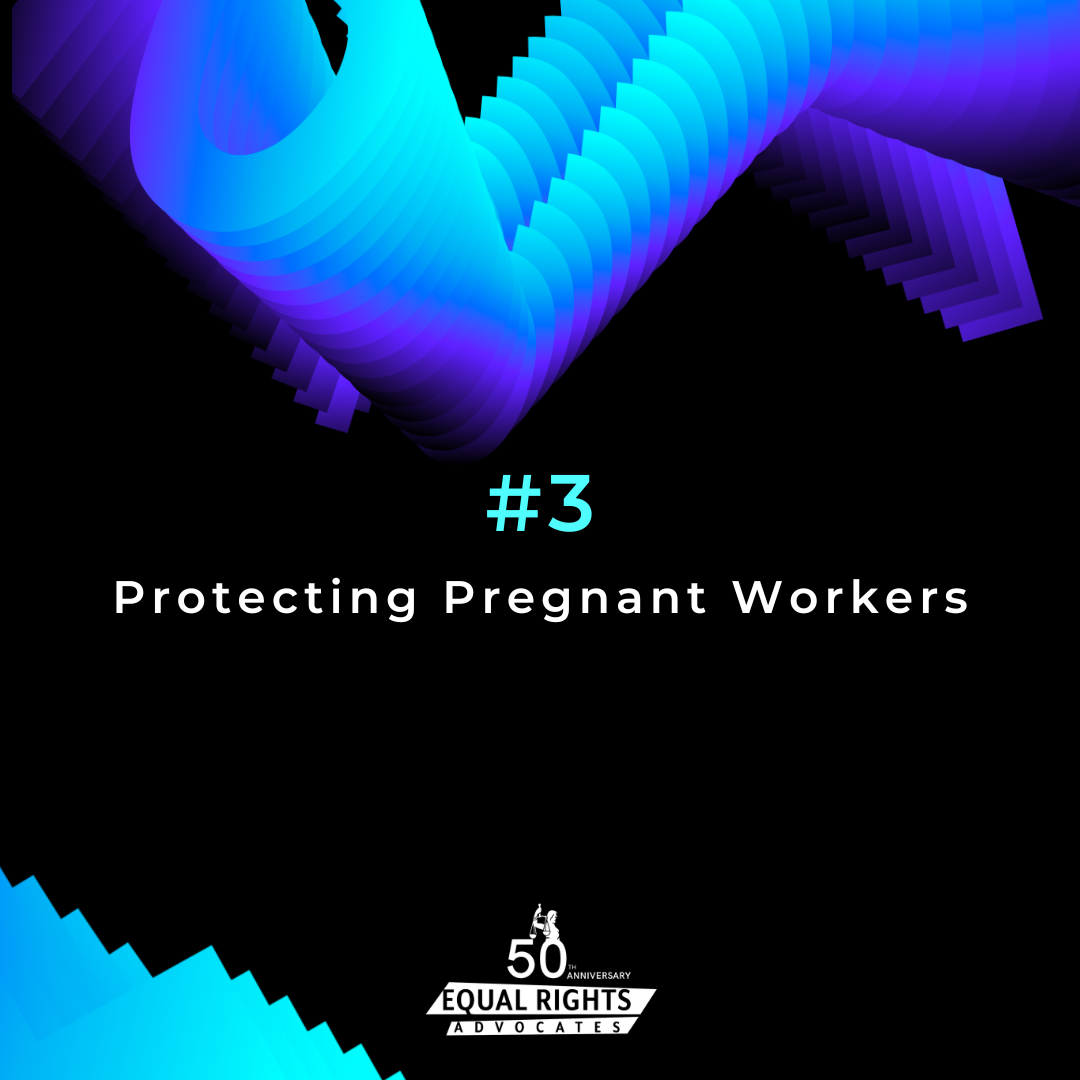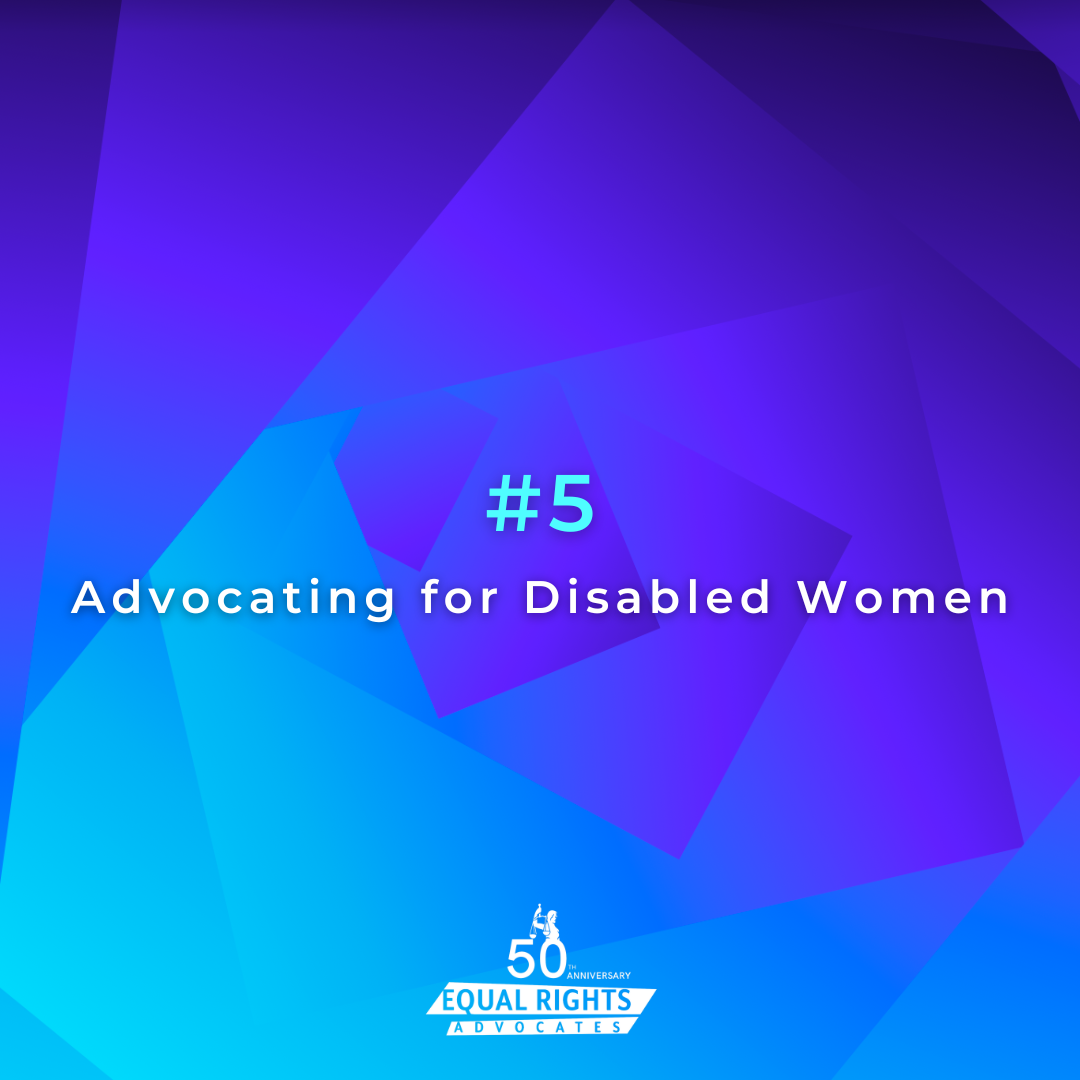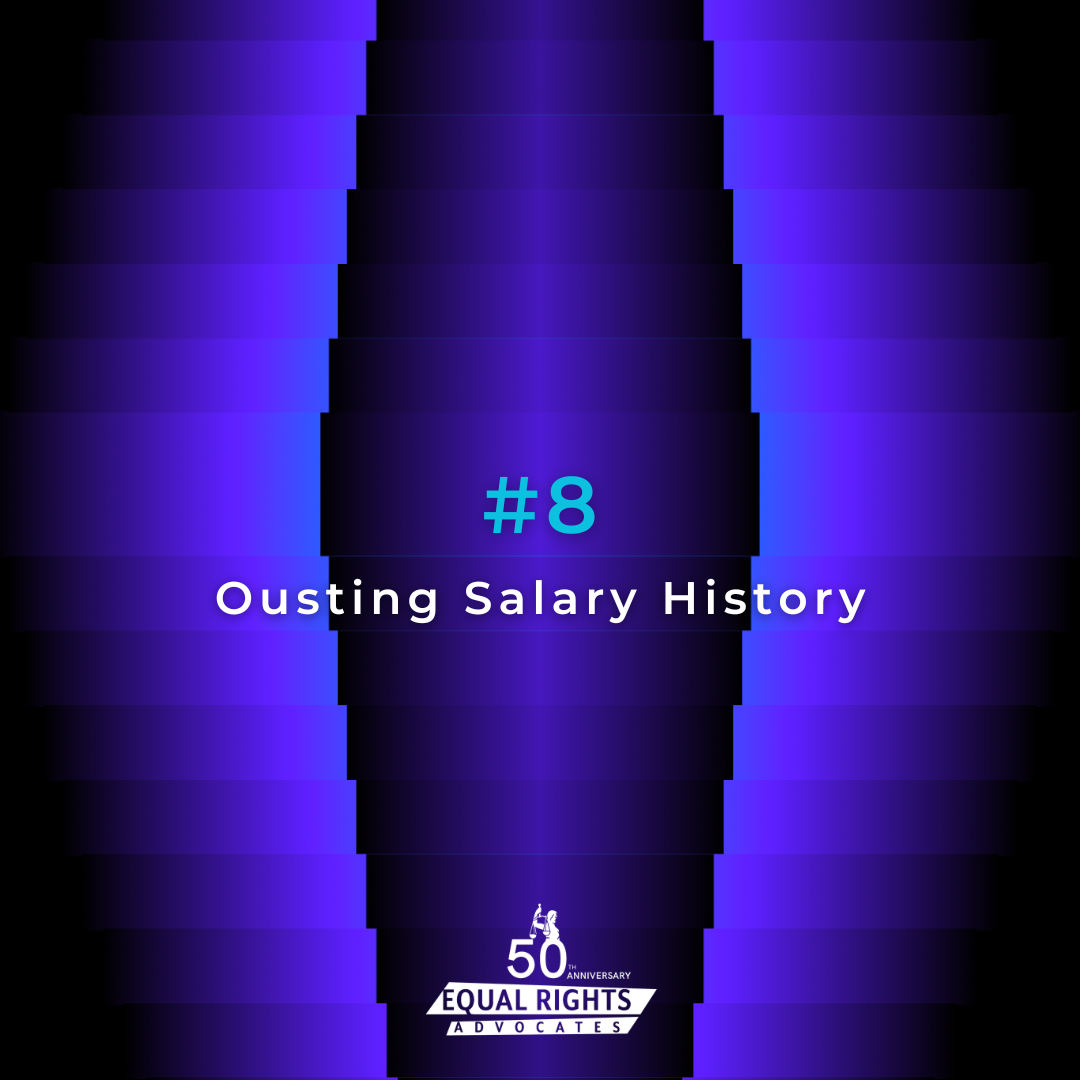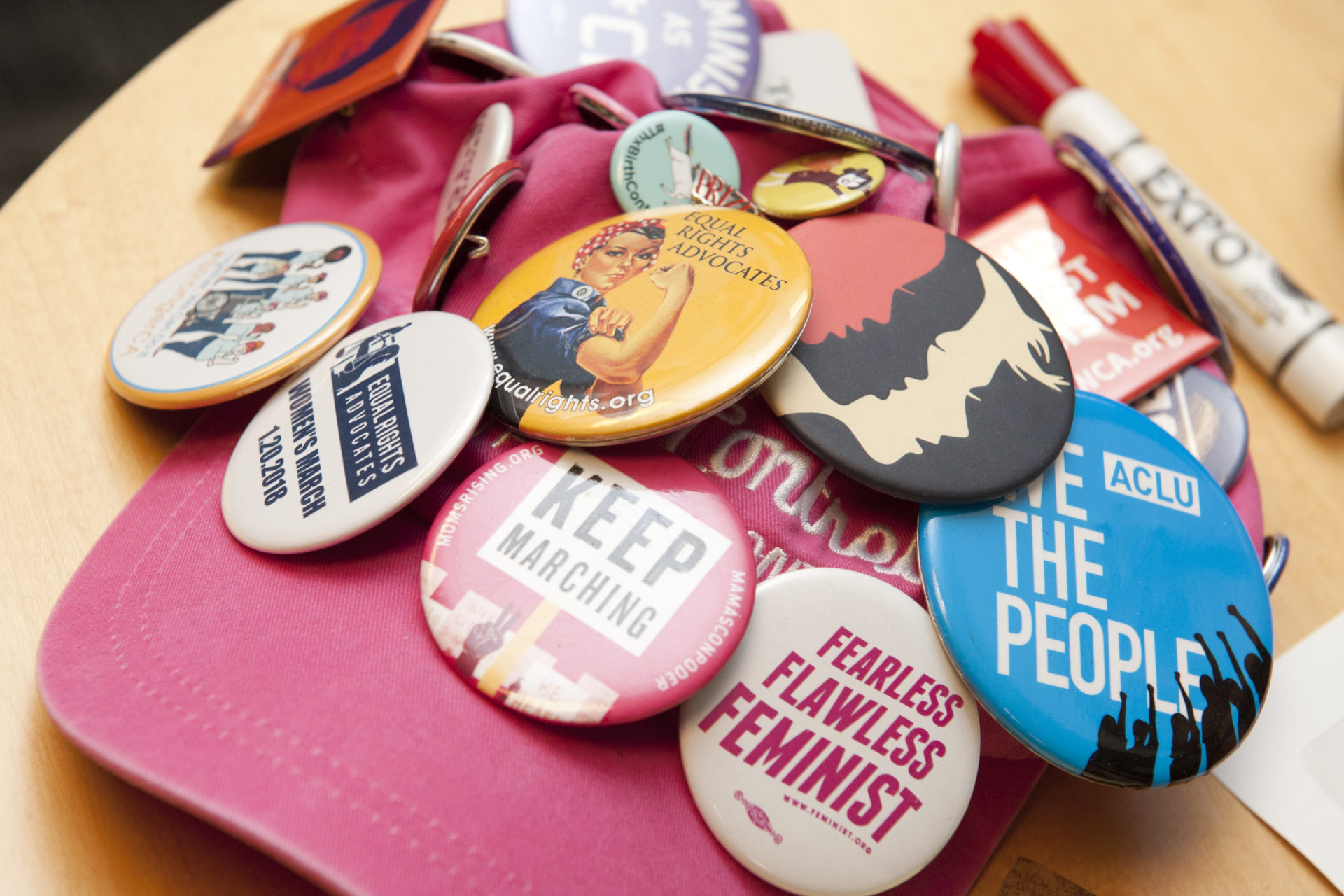As 2024 comes to a close, we’re reflecting on an extraordinary year for gender justice. Equal Rights Advocates celebrated our 50th anniversary with a landmark year marked by transformative victories and bold initiatives that continue to shape the future of economic security, civil rights, and justice for all.
From groundbreaking policy wins to uplifting the stories of those most impacted by inequity, we are proud to share our top 10 Gender Justice Moments of 2024. Each of these milestones represents the power of collective action and the unwavering commitment of our partners, clients, and supporters. Together, we’re building a more equitable world, and these achievements remind us of what’s possible when we fight for a vision of justice that leaves no one behind.

1. Celebrating 50 Years
We celebrated our 50th anniversary this year, connecting with many of you at events, online, in story-sharing videos, client and partner tributes, and an epic evening Gala. Since our founding in 1974, ERA has not only enforced civil rights laws; we’ve also drafted and passed them. We’ve broken ground for women in male-dominated fields, mobilized students to fight discrimination and sexual violence, and led the way in ensuring economic security for working women, gender-expansive people, and their families. Now, combining forces with advocacy and community organizations across the country, we are tackling big issues using a comprehensive approach grounded in the intersections of gender, racial, and economic justice. As we forge the future, we build on that inclusive vision of gender justice for all.

2. Hammering Home Equality
In May, we launched our Women Rebuilding America initiative this year to make sure women receive their fair share of the millions of new construction jobs created by the historic $4 trillion federal infrastructure package. Women in construction earn a career average $1 million more than those in women-dominated fields like service, retail, and childcare. Yet women still hold only 4% of these high-paying, union-protected trades jobs. After 50 years of working to open male-dominated fields to women, this May we proudly incorporated the National Taskforce on Tradeswomen’s Issues as an official project of ERA. The Taskforce leads policy advocacy campaigns and provides educational and advocacy opportunities for more than 400 individual members from 24 states and Washington D.C. By giving women equal access to construction trades jobs, we can help families across the country escape poverty and achieve economic security.

3. Protecting Pregnant Workers
We worked to expand pregnant workers’ rights at the federal and state level: (1) In April, we heavily supported a new EEOC rule for implementing the Pregnant Workers Fairness Act, which will ensure reasonable accommodations (such as additional bathroom breaks and access to a chair) during and after pregnancy, lactation, miscarriage, or abortion; and (2) in November, we and partners filed an amicus brief in an ongoing ACLU case supporting CA dockworkers’ right to pregnancy and lactation accommodations. Currently, these pregnant dockworkers must either risk taking unsafe assignments or lose their right to work that day. Our brief aims to make the lawsuit a class action so workers can combine forces for change.

4. Amplifying Black & Latinx Voices
Phase 2 of our Family Voices Amplified project asked Black and Latinx women about the systemic barriers blocking their families and communities from economic security 4 years after the pandemic. Partnering with National Black Child Development Center and Unidos US, we released our findings in November after deeply listening during trauma-informed workshops and in-depth interviews. Participants–who were paid for their time and ideas–named potential public policy solutions that we will work to advance next year and beyond, including livable wages, national paid family and medical leave, affordable healthcare, and anti-displacement housing policies. Hear from 4 of our participants in these powerful short videos.

5. Advocating for Disabled Women
In September, our Equal Pay Today initiative hosted the country’s first day of advocacy dedicated to disabled women’s economic justice. With nationwide partners, we raised awareness about the wage gap women workers with disabilities experience in the U.S.: an average 50 cents per $1 paid to nondisabled men. We also coordinated hundreds of partners across the country on seven other equal pay days, advocating for solutions to contributing factors such as occupational segregation, an unlivable minimum wage, and the compounding effects of intersectional ableism, sexism, and racism.

6. Banning Intersectional Discrimination
Leading the nation with state policy wins, our 2024 Stronger California agenda for gender, racial, and economic justice successfully passed the country’s first bill in September to explicitly recognize the concept of intersectionality in state anti-discrimination laws. Senate Bill 1137 ensures our laws account for the unique harm of experiencing multiple forms of discrimination or harassment at once. This means if a woman of color experiences intersectional discrimination at work, her employer cannot successfully discredit her by pointing to white women or men of color employees who haven’t experienced the same discrimination. This year’s state wins also enhance protections for sexual assault survivors, reduce barriers to accessing reproductive health care, streamline access to paid family leave, and more.

7. Honoring Lilly Ledbetter and the Pay Transparency Revolution
The equal pay movement lost a beloved icon in October. Lilly Ledbetter’s Supreme Court pay discrimination case against Goodyear Tire sparked an ongoing wage justice policy revolution, including the federal Lilly Ledbetter Fair Pay Act. Lilly inspired ERA and our Equal Pay Today partners to advocate for passage of dozens of new laws across the country, requiring employers to post salary ranges on job listings, stop relying on someone’s prior salary to set their new pay, and more. Our team shared stories about Lilly’s impact with CNN, Associated Press, Forbes, and more.

8. Ousting Salary History
In July, a presidential executive order banned employers from using someone’s prior wage history as a way to determine their pay in a new role, building on years of state laws that ERA helped pass. Using a new employee’s prior income to set their wages in a new role was a common practice that allowed pay discrimination to follow women and people of color from job to job. Banning this practice will help close gender and race wage gaps nationwide.

9. A Victory to End Hollywood Inequities
After decades of fighting for pay equity, Hollywood costume designers won a wage increase of more than 40% in June, raising their wages to finally match their male peers in comparable industry roles. ERA mobilized support for the Costume Designers Guild’s #NakedWithoutUs campaign, which exposed that this woman-dominated field has the lowest-paid workers in the industry. The Guild’s win brings costume designers’ pay in line with their industry’s male counterparts.

10. Pushing Pay Equity at Vassar College and Beyond
Our Vassar College pay discrimination lawsuit with Lieff Cabraser moved forward in September when a federal judge denied Vassar’s attempt to dismiss claims of long-standing gender-based pay disparities between male and female full professors. As a historic women’s college, we’re determined to ensure Vassar upholds its own stated values of gender equality. This class action lawsuit is ongoing, so stay tuned for updates. The case is one of efforts in hundreds of industries demanding wage justice.
Help us do more work like this in 2025 by contributing to our Rise & Defend Fund. Learn more!

